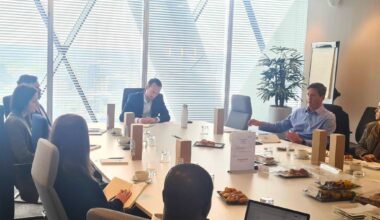Last week was International Women’s Day, and Q4 took the opportunity to host a fireside chat titled “Stakeholder Management and the Role of the Board”. The webcast was moderated by Donna De Winter, Q4’s COO, and featured our own female leaders–Colleen Johnston, Q4’s Board Chair, and Julie Silcock, our newest Board Member. The fireside chat touched on the illustrious Industry into value-creating board members, and the path to-and the benefits of having women on board.
Both Colleen and Julie come from a background in banking, but they have different experiences and career paths that led them to Q4’s Board of Directors. Colleen comes from a practitioner standpoint, as she was the CFO of TD Bank for ten years and played a large part in their recognition as the best company for IR in Canada.
She joined the Q4 board in 2019 as a passion project and told Donna she is proud to see how the business model evolved within the first year of business. Julie Silcock, who first partnered with Q4 in 2022 as our newest board member says she was impressed by Colleen’s presence as chair of the board. She gathered a mix of her own research, as well as many positive referrals to Q4 from previous clients, before interviewing for the board. Julie has spent her whole career in investment banking and therefore understands–from a sell-side perspective–the importance of a unified capital market standpoint.
With this fireside chat being held on International Women’s Day, the conversation not only touched on stakeholder management, but we saw a glimpse into the lives and careers of two very successful women in a traditionally male-dominated industry. Donna explained that while Q4 is well-represented in diversity on our board, that’s not necessarily the case elsewhere–with a mere 16% of most board members being female and only 5.5% of those members being the chair.
When asked what she thinks of her impact of gender diversity on board effectiveness and execution effectiveness inside the organizations, Julie explained that she feels competent women can really add significant value to boards. The more women are added, the more accepted it will be–especially to senior positions in management. She explained that she feels women introduce diverse thinking methods since they come from different backgrounds with different experiences, which drives innovation. She mentioned that it is incredibly uplifting to see women on a board and that it creates a more approachable space for other women to look up to.
Agreeing, Colleen added that during the hiring process, she feels that board members should be interviewed from the best available talent pool, no matter their gender. She also explains that hiring women is often a “check-box exercise,” simply to fill a gender quota. Women add value and talent, and not only play a part in helping a company survive but thrive and prosper. She even divulged that Julie was recruited from a diverse slate of candidates and was ultimately chosen because she was the best person for the job and had the most expansive background of experience.
She further explained that she and Darrell Heaps–Q4 Founder and CEO–agreed in advance that Q4 wants to recruit creative people for the company, yes for governance, but ultimately to advance the business model. Lastly, she explained that she feels that corporate Canada and corporate America need to do a better job of solving issues surrounding gender and that women need to push hard and believe in themselves to take roles in boards (which she likens to the top of the pyramid). Her advice to women is to take those roles that position themselves well for growth.
The conversation then shifted to stakeholder capitalism and its growth from traditionally strictly financial metrics to a multitude of measurements for performance. When asked if and how this would impact her role as a board member and if board members are prepared for this, Colleen explained that she started as a “humble” accountant and that everything revolved around making sure the numbers were right.
This changed halfway through her career, when she realized that it’s not making sure the numbers are right but focusing on the right numbers. She explained that yes, you could focus on driving your numbers, but at the end of the day, those are lagging indicators of success–there are so many indicators that you need to lean into, like the people agenda, and finding the right talent–so you need combined quantitative and qualitative measures. Finally, she said, “I do believe that driving for the longer term, focusing on a broader set of measures, and holding managers accountable for these measures is really important.”
Julie explained that she sees a mixture of measurements in her day job at an investment bank. On the one hand, she said, she works with younger companies that are valued at less than $500 million, which are quickly growing and often capital constrained, and therefore have to focus on financial metrics first and foremost. And on the other hand, with her board experience and focus on stakeholder capitalism she said, value creation doesn’t always relate to finances.
She went on to highlight the ways in which she has been able to add value to other public company boards she has been on, one of which she worked to change the pay scales and contracts, which helped in terms of the performance of the company. Another, was when she received an offer on a $2 billion market cap company from a private equity group. She hired a banker to conduct an auction and worked with the board, in order to provide insight and expertise for realistic expectations for a new buyer. She says “There are lots of ways to create value beyond just the financial metrics”.
Donna asked the panel if they think the industry can keep from tilting again to financial metrics as the be-all-end-all if we go to a bear market. Julie answered that she absolutely thinks so because although the market is unprecedented right now, the groundwork has already been laid, with ESG scores and women on boards, specifically referencing the progressive 2020 announcement by Goldman Sachs that they are “not going to take a company public unless there’s at least one diverse board candidate, with a focus on women,” as CEO David Solomon announced.
She went on to say, “I also really think people have appreciated the value in all these initiatives. And I think for companies to attract new investors, grow the business, and engage the workforce; they’ve got to continue to be focused on the longevity of stakeholder capitalism. So it’s here to stay; it’s just going to be a little bit muted. Until we work through the market gyrations that are currently going on”.
To further delve into reporting and measuring performance, Donna asked the pair how management teams and IROs should approach reporting performance, risk and strategy, and if there are new ways of measuring stakeholder value or broadening from shareholder to stakeholder. Julie answered by explaining leaders need to consider and think more openly about a lot of new factors in the workplace, including flexible hours, remote work, diversity, equity, etc.
She explains that many Fortune 500 companies now offer more perks to work for them, such as flexible hours which makes it a more attractive place to build your career. Colleen shared a different perspective, suggesting that because of these tumultuous times with COVID-19 and “the great resignation”, teams need to re-articulate their strategy, their values and tact, and talk openly about their thoughts on these challenges. Relating it back to her time at TD Bank, she shares that doubling down on IR and having many different techniques for coping and managing helped their brand soar.
To wrap up the chat, Donna asked the speakers what the best piece of advice that they’ve been given or they can share in their positions. Julie shared some advice for our female viewers, saying that you should view yourself as a person first and foremost, and not only as a woman. She shares that she has never chosen to think of herself as a woman or someone with limitations in her field, but as an experienced, accomplished executive. Colleen advises to play the long game and be tough.
You can watch the full event recording here.


